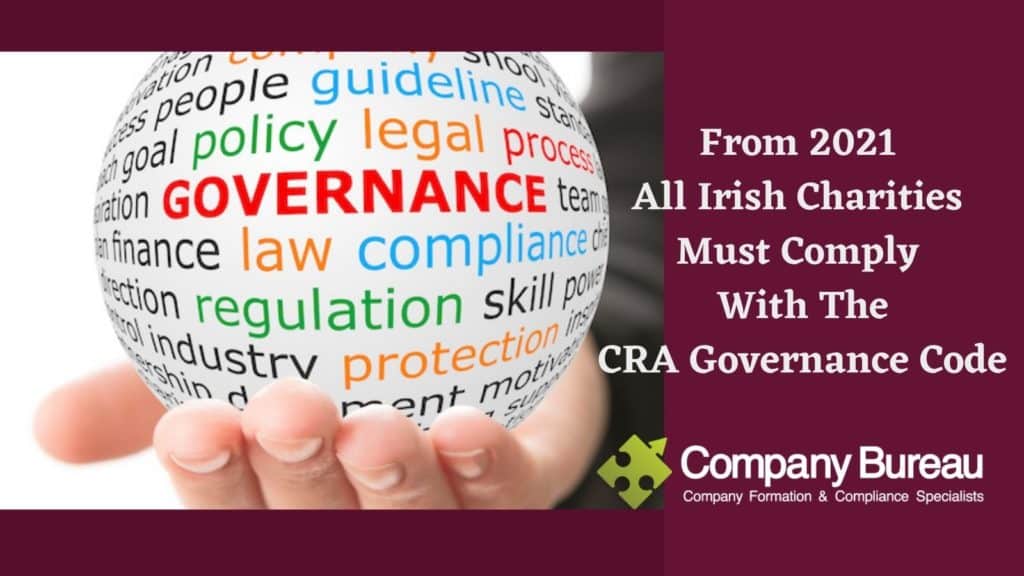Blog
From 2021 all Irish Charities must comply with the CRA Governance Code
By Caitlyn Buchanan, 13th March 2021
From 2021, all charities must prepare an annual submission to comply with the Charities Regulatory Authority (CRA) Governance Code. The CRA Governance Code is relevant to every charity operating in Ireland including voluntary public hospitals and healthcare providers with charitable status. The ongoing pandemic has put increased pressure on charities, particularly those which provide healthcare services. However, it is vital that all Irish charities comply with the charities governance code as well as other ongoing governance obligations.
The Charities Regulator advised that the required policies and procedures were put in place during the 2020 period. Starting from 2021 all Irish charities are required to certify with the Regulator that they have been compliant with the Charities Governance Code during 2020 and continue to operate according to best practice standards of governance. Good governance involves putting in place systems and processes to ensure that an Irish charity achieves its charitable objectives with integrity and is managed in an accountable and transparent way.
What is the CRA Governance Code?
The Charities Governance Code contains six principles defining the minimum standards that should be met when effectively managing and controlling an Irish charity. The Code specifically aims to help charity trustees to implement processes that meet their legal duties under Charity Law. This article covers the key points that Irish charities who have not yet adopted the Code will need to prepare for.
Many registered charities in Ireland operate as volunteer-only or with a small number of paid staff. The Charities Regulatory Authority (CRA) has specified 32 specific standards for these smaller organisations. For charities with high levels of income, complex funding structures, or a large number of employees there are 49 best practice standards to be met.
Reporting on Compliance with the CRA Governance Code
Under the Charities Act 2009, all registered Charities in the Republic of Ireland must submit an Annual Report to the Charities Regulator within ten months of its financial year-end date. For example, if a charity’s fiscal year-end date is 30th November 2020, the Annual Report for that charity is due to be filed with the Charities Regulator before 30th September 2021. Charities will be required to declare their compliance with the Charities Governance Code upon filing the Annual Report in 2021.
All charities must provide an annual report to the Charities Regulator indicating whether or not the charity complies with the Code. It is not enough to state that the charity is compliant, each specific standard must be demonstrated on the Compliance Record Form. If the company is not in compliance with a standard an explanation should be provided. Valid reasons for non-compliance may include:
- The charity is in the process of winding up.
- The charity is newly established and needs more time to implement full compliance measures.
Legal duties of Irish Charity Trustees
Under the Charities Act 2009 charity trustees must ensure their Charity meets all relevant legislation such as data protection, employment, and health and safety legislation. There are also specific compliance duties that charity trustees must adhere to including:
- Complying with the charity’s Governing Document.
- Manage the charity’s resources responsibly.
- Ensure your charity is carrying out its charitable purposes for the public benefit.
- Be accountable and in compliance with the law.
- Act with reasonable skill and care.
- Act in the best interest of the charity.
If the charity is a registered Irish company and a charity trustee is also a company director, there are additional duties under company law that must be met. Read more on the Duties of Company Directors.
Six Principles of the Charities Governance Code
Charities Regulatory Authority has outlined six items of governance which all charities will need to apply. These core standards are expected to be met by all charities when putting the principles into action to ensure accountability and transparency.
1. Advancing the Charitable Purpose
A charity must provide a public benefit under at least one of the four ‘categories of charitable purposes’ set out by the Charities Act 2009:
- Prevention or relief of poverty or economic hardship
- Advancement of education
- Advancement of religion
- Other purposes that are of benefit to the community
It is important to establish an appropriate system to evaluate the effectiveness of the work a charity does and monitor progress against the charity’s objectives.
2. Behaving with integrity
Ethics are fundamental in the charity sector and all charity trustees must act with integrity. Trustees have a legal duty to act in the best interest of the charity that is independent of personal interests or those of other individuals or bodies. It is recommended that an Irish charity have an internal code of conduct that is signed by all charity trustees setting a clear standard of behaviour. This should include a clause for keeping sensitive board matters confidential as well as how to best manage gifts, hospitality, and out-of-pocket expenses. This will help to create an ethical culture and shared set of values that is reflected in everything the charity does.
3. Leading People
A charity’s people are its most essential resource, they may include volunteers, employees and contractors (either voluntary or paid). A charity trustee is responsible for promoting a culture of respect where their people feel valued. Part of this is having clearly defined roles within the organisation and processes to be followed when issues arise.
Charities that employers paid staff have additional legal responsibilities to ensure compliance with employment legislation including recruitment, training & development, appraisal, remuneration paid for work, and dismissal.
4. Exercising Control
All charities have legal and regulatory requirements that they must adhere to. Charitable companies have a Governing Document or Constitution which is a legally binding document in its own right. Exercising proper control of a charity includes reducing risks to keep the confidence of regulators, funders, beneficiaries, and the general public. The trustees are responsible for all assets that the charity holds such as funds, or property.
Core standards for exercising control include:
- Determining if the charity’s current legal form and Governing Document are fit for purpose. If changes are necessary, the Charities Regulator should be informed in advance.
- Stay informed of the relevant laws and regulatory requirements and comply with them.
- A charity that raises funds from the public has specific guidelines which must be adhered to.
- Establish appropriate financial controls to manage and account for the charity’s money and other assets.
- Identify risks which the charity might face and how to manage them.
- Seek appropriate and adequate insurance coverage.
5. Working Effectively
Effective charities have capable trustees with a mix of skills, knowledge, and experience who work together as a team. Bringing in new trustees is a good way to improve efficiencies provided they are properly briefed on the charity’s unique operations. Some charities may consider introducing a maximum term limit for trustees to replenish skills and fill any gaps.
Like other people involved with the charity, the trustees should have clearly defined roles, which may be set out in the Governing Document. Holding regular board meetings is essential for addressing important topics and ensuring cohesiveness. In general, the board agenda should always include these items: reporting on activities; review of finances; conflicts of interests and loyalties.
6. Being Accountable and Transparent
Accountability of Irish charities goes beyond just accounting for money brought in and spent. Any organisation that provides a public benefit must be able to clearly state what it does and how it does it to anyone who asks. A charity must build trust with several stakeholders including its members, staff, volunteers, partner organisations, funders & donors, regulators, public representatives, the people who benefit from its services, and the public in general.
Charities can build trust by being open and transparent both within their organisation and within the charity sector. Follow these tips to ensuring accountability and transparency:
- Display the name and Registered Charity Number (RCN) on all written materials, including the website, social media channels, and email communications.
- Identify the charity’s stakeholders and decide how to involve them in the charity’s planning, decision-making, and review processes.
- Establish a procedure for dealing with queries, comments, and complaints.
- Follow reporting requirements for all funders and donors, both public and private. Ensure full financial accounts and annual reports are made easily available.
Conclusion
To ensure compliance with the Code, Irish charities must complete the Compliance Record Form every year for the Charities Regulator. Be prepared to identify the actions taken to meet each standard. Every charity is unique and may choose how it meets the standards given its specific circumstances. The board of charity trustees may discuss, agree and document within a period that is appropriate for your charity, in terms of size, income and structure. The Charities Regulator is flexible and will accept a variety of ‘evidence’ that a company is adhering to the Code. For example, many of the core standards within the Code can be met with accurate board minutes which shows decisions have been discussed and documented. In time, Charities Regulator will publicly display on the Irish Register of Charities whether or not a charity complies with the Charities Governance Code.
More information about how to ensure compliance with the Governance Code can be found on the Charities Regulator website.
Disclaimer This article is for guidance purposes only. It does not constitute legal or professional advice. No liability is accepted by Company Bureau for any action taken or not taken in reliance on the information set out in this article. Professional or legal advice should be obtained before taking or refraining from any action as a result of this article. Any and all information is subject to change.


